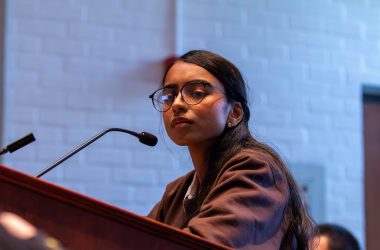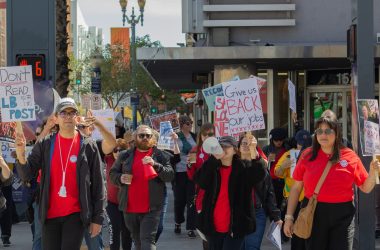Earlier this semester, it was revealed that the president of the Associated Students, Inc., Jose Salazar, was unable to legally get paid for his job as president because he is undocumented, causing uproar from campus cultural organizations, students and faculty.
Salazar was unable to get paid because he had not yet completed his Deferred Action for Childhood Arrivals paperwork, or DACA, that would have allowed him to get paid.
The ASI “Policy on Executive Fellowships” specifically classifies the payments executives receive as fellowships, meaning it is considered taxable income, in which case, an undocumented student cannot receive it.
Salazar brought the issue to the ASI Senate and suggested policy revisions to the ASI Board of Control to change the “fellowships” to “scholarships.”
This would allow a future undocumented student the ability to get paid, but could possibly take away the terms and conditions that executives must follow. Many ASI members feared this would weaken ASI’s ability to keep executives accountable in their jobs and responsibilities.
The BOC originally set out to revise the policy themselves, but after seeing it to be too big of a task to accomplish in BOC meetings alone, they created an Ad Hoc Committee made up of ASI Senators, students and faculty to explore the changes and bring in experts to advise in specific areas.
Updating the policy
The committee has finished making its proposed changes to the policy and presented it to the Board of Control to be reviewed and further revised, ASI treasurer Wendy Lewis said.
The proposed policy changes that the committee made focus on changing the fellowships into scholarships as the structure ASI executives will be paid by. Although the policy change would allow any student, undocumented or documented, to get paid for their work as an executive in ASI, there are still many concerns the BOC is still working out.
The ASI executive director, Richard Haller, and the Director of Financial Aid, Nick Valdivia are working on making sure the policy is well-written, “so that it’s still inclusive to 100 percent of our student population, but also so it is able to be honored in the financial aid office,” Lewis said.
If the pay structure were to be changed to a scholarship, the payments would be distributed through the financial aid office and may affect the financial aid eligibility of a student in executive office. Although the scholarship would cover the living expenses of a student, this was a big concern for many in ASI.
To remedy this, the BOC is discussing making sure candidates have an appointment with the financial aid office and, if need be, the DREAM Resource Center, as part of ASI election information sessions.
This would ensure that students running for an executive position are fully aware of how the payment would affect their financial aid, if it were to be changed to a scholarship. If students decide the financial impact is one they cannot take, they can choose not to run, Lewis said.
“The way I look at it is we wouldn’t be excluding them because they just wouldn’t be able to, it would actually be because it was their choice not to,” Lewis said. “Whereas, if we left it the same way, they wouldn’t be able to run because they are not able to at all, even if they wanted to or not.”
In addition to their findings on the pay structure, the committee suggested that the Senate look at the bylaws to add one or two more executive positions to share the workload of the executives. This prompted ASI to conduct “desk audits” of the executives, where they sat down with the ASI secretary and wrote down all the work they do in their position. This was also done to give future candidates a realistic look at the time commitment the jobs entail, Lewis said.
BOC will vote on the policy once more next semester. If it passes, it will be moved to Senate for the final votes. However, even if the Senate passes the policy changes, President Salazar will still not be able to get paid, as the new policy could not be enacted until the end of his term.
Picking up another job for Salazar
Part of the conditions of being an ASI executive is not holding any other jobs outside of the position. Salazar was unable to agree to these conditions because he was never able to get paid, he said.
Salazar holds several jobs outside of his presidential position, including working in construction and working with the California-Mexico Project, he said. In addition, he has taken on another job with the College of Engineering doing research on the allocation of space within the college.
It is to be noted that this research is not related to the Friday class policy that is being re-implemented to try to allocate classrooms more efficiently campus-wide, Forouzan Golshani, dean of the College of Engineering, said.
Salazar will be researching how space is utilized by student clubs in the COE and how it the utilization of space in the college can most effectively be used. Golshani said the college has 25-30 clubs with different levels of access to the classrooms, labs and offices. The size of the college over the past eight years has grown from 2800 to 4800 students, he said.
“It’s not ASI-related at all,” Salazar said. “And it’s not [affecting] anything in my job in ASI, I’m still doing my job here as president, it’s just another weight on my shoulders I have to carry … Even if I do just work here for free, how am I going to sustain myself? How am I gonna help out my family? So … I’m basically volunteering, I have come to peace with that.”
Golshani said they are still budgeting out the grant and working out further details.
“He has been a senator, he is very involved with multiple clubs in the college, and he’s better qualified than anyone else I know,” Golshani said. “… This is a good project, very useful for our college, and we’re looking forward to hearing Jose’s perspective on it.”



